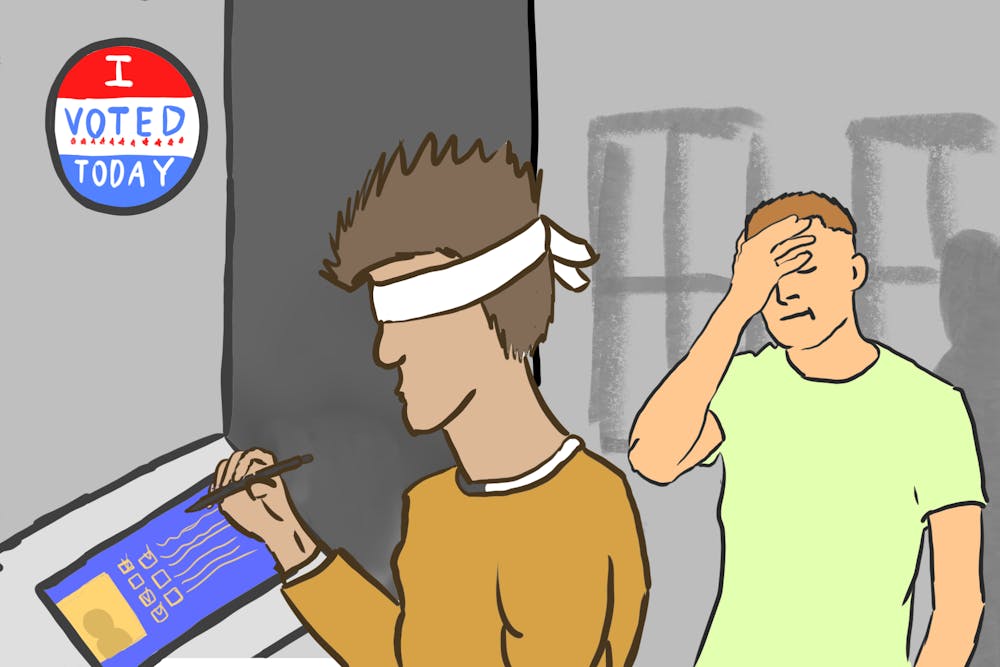In Ohio, out-of-state students can vote in statewide and countywide elections in whichever county their college belongs to. Miami University students, for example, can vote in Butler County and Ohio state elections. In national and state censuses, out-of-state college students are counted in the population in the state of their college, not their hometown. In short, Miami students are counted as permanent residents.
As an out-of-state student, you can elect Ohio House members and Senators to both state and federal congresses. You can vote to pass or kill local and state legislation regarding everything from gun control and tax laws to abortion rights and posted speed limits.
But are out-of-state students really permanent residents? We live in Oxford for 26 weeks of the year, and sure, legally we are residents of Oxford. But is it right to vote for policies and individuals that may not have lasting effects on our lives, but will have lasting effects on others?
As an out-of-state student, I contend that we as students should abstain from voting in Butler County and Ohio elections as a matter of morality. We wield the voting power of permanent residents, which many of us aren’t, and may never be. We should not cast our opinions in elections that will directly impact the lives of permanent Butler County and Ohio residents.
For context, the Tenth Amendment in the United States Constitution leaves decisions not made by the U.S. federal government up to the states. This allows states to make decisions and laws that more closely align with the needs and values of their respective constituencies. Examples include state tax codes, abortion rights, business regulation and public school funding.
If out-of-state students decide to vote in local and state elections, they need to ask themselves whether they’re voting for the right reasons, or whether they should vote at all.
For most students, Ohio, and Butler County specifically, is not our home. We live here, but we were not born here. While we may have a general grasp of the opinions, values and legislative priorities of Butler County and Ohio residents, we cannot pretend to intimately understand them the way an Oxford townie or a Cleveland native might. We are simply not positioned to make informed, reasonable voting decisions.
This complicates the ethics of voting on issues such as an increase in funding for Ohio public schools, for example.
While it’s perfectly acceptable to support increased funding for public schools nationwide, using your out-of-state vote to help increase another state’s school funding – a state that you don’t pay taxes in – is an abuse of your right to vote within the state. Asserting one’s personal political priorities in regions where you otherwise wouldn’t be voting is wrong and self-serving.
Further, when one considers that many out-of-state students will never return to live in Ohio after their short four years in school, the out-of-state vote becomes even more unethical. To reuse the example of the Ohio public school funding increase, an out-of-state student voting for or against the measure places the short and long-term consequences of their vote onto the taxpayers and students of that state, with the out-of-state student, soon to leave for good, bearing only the short-term consequences.
This goes for other issues, too. Whether it’s reproductive rights, fracking and renewables, gun control or economic policy, the moral conundrum cannot be avoided. Any vote from an out-of-state student sets up the potential for a negative externality borne by the permanent residents in the state of the student’s college. It is not within our moral right to assert our political convictions in states where we don’t live or pay taxes.
Now, that’s not to say out-of-state students shouldn’t vote. Students from other states can fill out absentee ballots for elections in their home state. Or, if they want to see a policy implemented nationally, they can vote for their preferred home state’s congresspeople, senators or presidential candidates to push bills through Congress and write them into national law.
Enjoy what you're reading?
Signup for our newsletter
Participation in our political system is important, but it’s a privilege we must use responsibly. A legal right doesn’t necessarily imply a moral one. Give it some thought before you decide which election you’ll vote in this coming November.
Harry Hittle is a first-year English literature major with a minor in economics. He is a contributing writer for The Miami Student’s Campus & Community section.




